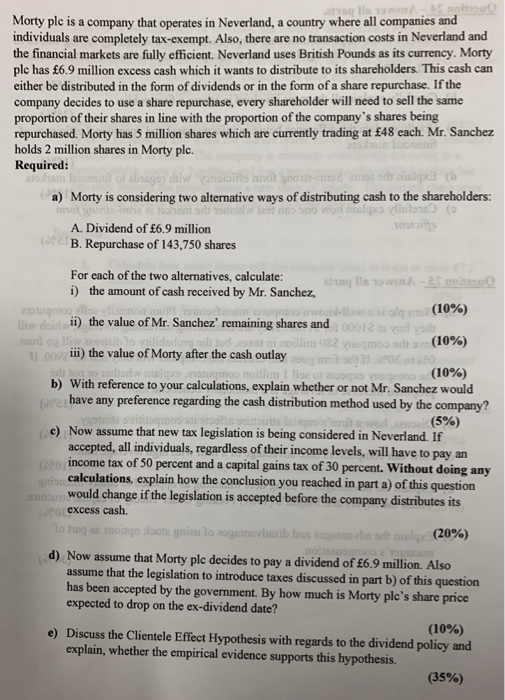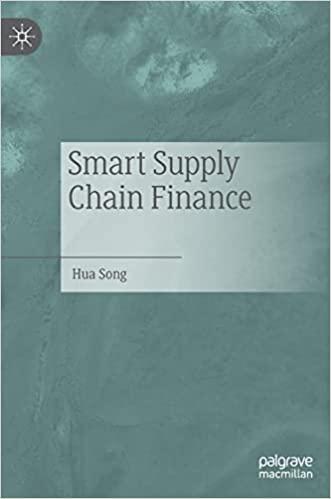Morty plc is a company that operates in Neverland, a country where all companies and individuals are completely tax-exempt. Also, there are no transaction costs in Neverland and the financial markets are fully efficient. Neverland uses British Pounds as its currency. Morty ple has 6.9 million excess cash which it wants to distribute to its shareholders. This cash can either be distributed in the form of dividends or in the form of a share repurchase. If the company decides to use a share repurchase, every shareholder will need to sell the same proportion of their shares in line with the proportion of the company's shares being repurchased. Morty has 5 million shares which are currently trading at 48 each. Mr. Sanchez holds 2 million shares in Morty plc Required: a) Morty is considering two alternative ways of distributing cash to the shareholders: to A. Dividend of 6.9 million B. Repurchase of 143,750 shares For each of the two alternatives, calculate: i) the amount of cash received by Mr. Sanchez, ii) the value of Mr. Sanchez' remaining shares and ii) the value of Morty after the cash outlay have any preference regarding the cash distribution method used by the company? (10%) (10%) (10%) b) With reference to your calculations, explain whether or not Mr. Sanchez would (5%) e) Now assume that new tax legislation is being considered in Neverland. If accepted, all individuals, regardless of their income levels, will have to pay an income tax of 50 percent and a capital gains tax of 30 percent. Without doing any calculations, explain how the conclusion you reached in part a) of this question would change if the legislation is accepted before the company distrbutes its excess cash. (20%) d) Now assume that Morty ple decides to pay a dividend of 6.9 million. Also assume that the legislation to introduce taxes discussed in part b) of this question has been accepted by the government. By how much is Morty plc's share price expected to drop on the ex-dividend date? e) Discuss the Clientele Effect Hypothesis with regards to the dividend policy and (10%) explain, whether the empirical evidence supports this hypothesis. (35%) Morty plc is a company that operates in Neverland, a country where all companies and individuals are completely tax-exempt. Also, there are no transaction costs in Neverland and the financial markets are fully efficient. Neverland uses British Pounds as its currency. Morty ple has 6.9 million excess cash which it wants to distribute to its shareholders. This cash can either be distributed in the form of dividends or in the form of a share repurchase. If the company decides to use a share repurchase, every shareholder will need to sell the same proportion of their shares in line with the proportion of the company's shares being repurchased. Morty has 5 million shares which are currently trading at 48 each. Mr. Sanchez holds 2 million shares in Morty plc Required: a) Morty is considering two alternative ways of distributing cash to the shareholders: to A. Dividend of 6.9 million B. Repurchase of 143,750 shares For each of the two alternatives, calculate: i) the amount of cash received by Mr. Sanchez, ii) the value of Mr. Sanchez' remaining shares and ii) the value of Morty after the cash outlay have any preference regarding the cash distribution method used by the company? (10%) (10%) (10%) b) With reference to your calculations, explain whether or not Mr. Sanchez would (5%) e) Now assume that new tax legislation is being considered in Neverland. If accepted, all individuals, regardless of their income levels, will have to pay an income tax of 50 percent and a capital gains tax of 30 percent. Without doing any calculations, explain how the conclusion you reached in part a) of this question would change if the legislation is accepted before the company distrbutes its excess cash. (20%) d) Now assume that Morty ple decides to pay a dividend of 6.9 million. Also assume that the legislation to introduce taxes discussed in part b) of this question has been accepted by the government. By how much is Morty plc's share price expected to drop on the ex-dividend date? e) Discuss the Clientele Effect Hypothesis with regards to the dividend policy and (10%) explain, whether the empirical evidence supports this hypothesis. (35%)







